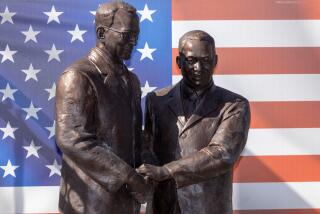The Case of the Disappearing Hahn Political Base
- Share via
With the mayoral race less than a year away, there’s increasing speculation that Mayor James K. Hahn can be toppled. The last few months certainly haven’t been politically kind to him. Critics regard his low-key governing style as weak leadership. A flagging local economy, coupled with dwindling state and federal dollars, have made it difficult for Hahn to keep his campaign promises, particularly expanding the Los Angeles Police Department.
But Hahn has more than budget problems. City Controller Laura Chick released a scathing audit of Los Angeles International Airport contract practices, in which she expressed “concerns about potential conflict of interest, fraud, misuse of power and inappropriate award of contracts.” The district attorney’s office is investigating allegations that former Airport Commission President Ted Stein pressured city contractors to contribute to Hahn’s successful fight against San Fernando Valley secession in exchange for LAX contracts. Stein, one of the mayor’s most prolific fundraisers, has denied the allegations, and Hahn has supported him. Stein resigned his commission post last week, citing “distractions associated with the totally unfounded and malicious ‘pay to play’ allegations against me.” A federal probe of the allegations is also underway.
Before Stein’s departure, four deputy mayors left the Hahn administration, including Troy Edwards, a key fundraiser in Hahn’s 2001 campaign and onetime liaison to the three departments under legal scrutiny -- Airports, Harbor and Water and Power.
All this had fostered a perception of disarray in City Hall, which has reinforced the impression that the mayor is politically vulnerable.
Hahn beat former Assembly Speaker Antonio Villaraigosa in the 2001 mayoral race by assembling an electoral coalition of African Americans and San Fernando Valley conservatives. According to The Times exit poll, Hahn defeated Villaraigosa 4 to 1 among blacks and 3 to 2 among whites. The mayor also won South Los Angeles by a 2-to-1 margin and carried the Valley, which accounted for 42% of the city’s electorate, with 55% of the vote.
But in February 2002, Hahn alienated the strongest pillar of his coalition when he announced his opposition to a second term for Police Chief Bernard C. Parks. A Times poll taken during the fight over Parks’ tenure showed Hahn’s approval rating slipping to 30% among blacks, compared with a 71% approval rating for Parks. And 47% of blacks -- compared with 22% of whites -- said Hahn’s opposition to Parks made them less supportive of the mayor. Since then, Hahn’s ratings among blacks have improved, but not dramatically.
Then in November 2002, city voters followed Hahn’s lead and rejected Valley secession. But though the measure was defeated 2 to 1 citywide, 51% of Valleyites voted to secede. Hahn’s active opposition to breaking up L.A. earned him the enmity of Valley secessionists, weakening the remaining pillar of his 2001 electoral coalition.
So far, only state Sen. Richard Alarcon (D-Sylmar) and now-Councilman Parks have pulled papers to start raising money for a possible mayoral run. Alarcon could hurt Hahn among Latinos and Valley voters, and Parks could further dilute the mayor’s support among black voters.
Former Assembly Speaker Bob Hertzberg could also cut into Hahn’s Valley support, as well as attract Jewish and Westside voters. As a Valley lawmaker, Hertzberg was instrumental in legislation that put secession on the ballot. An advisor to Gov. Arnold Schwarzenegger, Hertzberg might also appeal to moderate Republicans. (Although moderate GOP voters were only 9% of the 2001 electorate, they gave Hahn 70% of their vote.)
After flirting with a mayoral run, Chick opted out last week. Her probable voter pool of Valleyites and Jewish Angelenos (who comprised 18% of the 2001 electorate and gave 54% of their votes to Hahn) would have overlapped with Hertzberg’s. With Chick out, women voters (who were 53% of the electorate in 2001 and gave Hahn 56% of their votes) would also be more in play.
Councilman Villaraigosa has indicated he’ll sit out the 2005 contest, hoping perhaps for a job in a Kerry administration. But that dynamic could shift with Hahn’s fortunes. In the 2001 mayor’s race, Villaraigosa was particularly strong among liberal, Latino, Catholic, Westside and Central L.A. voters.
Hahn, Villaraigosa and Alarcon all claim strong ties to organized labor. In 2001, Hahn and Villaraigosa virtually split the union vote, 52% to 48%.
When you add it up, Hahn can no longer rely on his 2001 winning coalition of white Valleyites and black voters. And he’ll probably face strong competition for Latino voters (he got only 18% of their vote in 2001), and Jewish and Westside voters.
Conventional wisdom says multiple candidates will split the anti-Hahn vote, ensuring at least a runoff. But if Hahn’s base is nibbled away, he could find himself below the top two finishers.
Angelenos have not ousted an incumbent mayor since Tom Bradley defeated Sam Yorty in a 1973 runoff. But until 2003, Californians had never recalled their governor.
Perhaps most daunting to potential contenders is the mayor’s $1.3 million war chest. For challengers, that’s a fundraising edge difficult to overcome under the city’s campaign financing rules.
Still, a candidate needs to motivate his or her political base to have a chance of winning. That requires the candidate to have one. At this early stage of a bumpy campaign, it’s not clear Hahn does.
More to Read
Sign up for Essential California
The most important California stories and recommendations in your inbox every morning.
You may occasionally receive promotional content from the Los Angeles Times.













